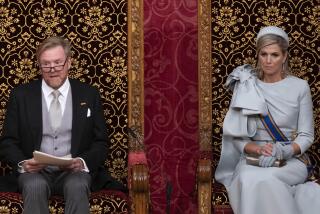Botha Heir-Apparent Vows Drastic S. Africa Changes
- Share via
JOHANNESBURG, South Africa — Frederik W. de Klerk, the man expected to be South Africa’s next president, unofficially opened the nation’s general election campaign Friday by declaring his party “totally opposed” to white minority rule as well as black majority rule.
De Klerk, leader of the ruling white National Party, said in a speech to the white chamber of Parliament that he is seeking drastic changes in South Africa’s political system. But he gave no details.
The speech represented De Klerk’s first major policy address since President Pieter W. Botha set Sept. 6 for parliamentary elections and indicated he would then retire after 11 years at the helm of the white minority-led government.
De Klerk, 53, the minister of education, was effectively designated as the next president when he was elected party leader in February to replace Botha, who had suffered a stroke and stepped down from the party post. The National Party, which has controlled the government for 40 years, is heavily favored in the elections.
Although little is known about De Klerk’s plans for the country, he is viewed by some political analysts as more likely to pursue the apartheid reforms begun by Botha but allowed to rust in recent years.
Other analysts think that De Klerk, while more willing to compromise with the government’s opponents than is the autocratic Botha, will focus his attention on protecting the interests of the white minority.
De Klerk’s speech Friday set out a middle road for the National Party in the forthcoming elections by criticizing both its principal white challengers--the right-wing Conservative Party, the official opposition in Parliament, and the anti-apartheid Democratic Party, formed recently by the merger of the Progressive Federal Party and two smaller parties.
“You dare not destroy your future by chasing after leftist and rightist dreams,” De Klerk told white voters. Then, in a remark directed at conservative whites, he added: “The National Party is the only party not running away from reality. The present situation cannot last indefinitely. Things will have to change drastically and quickly.”
He said he envisions a system of government in which decisions are made by consensus and disputes settled by “a fair referee.” More specific plans for the future would have to wait until after the election, he added.
The country’s black majority, which accounts for about 75% of the population, has no vote in national affairs. Asians and mixed-race Coloreds have their own subordinate chambers in Parliament.
Minorities Not Protected
The National Party has in the past said it supports limited black participation in national government. But party leaders oppose the one-person, one-vote system, contending that it provides no protection for minorities and would allow blacks to dominate whites.
De Klerk did not stray from that position Friday. On the one hand, he said: “White domination, as the Conservative Party calls for, leads inescapably to catastrophe . . . conflict and revolution. White security can never be built on injustice toward others.”
On the other hand, he said, the liberal white Democratic Party’s support for a one-person, one-vote system “would inevitably lead to majority rule and (black) domination . . . and is therefore totally unacceptable.” He called the Democratic Party’s platform “an unattainable non-racial Utopia.”
In the past week, two of Botha’s Cabinet ministers, both provincial National Party leaders, have announced plans to resign. One is Chris Heunis, architect of the five-year-old tricameral Parliament and leader of the government’s mostly unsuccessful effort to undertake talks with black leaders respected by the black masses.
Both Heunis and Stoffel Botha, who resigned as minister of home affairs, said they were leaving politics for personal reasons.
But Heunis, a strong supporter of President Botha and the party leader in Cape province, resigned a week after suggesting, in a Parliament speech, that blacks be given a role in Parliament, in the Cabinet and in the selection of a president.
Conservative Party leaders had criticized Heunis, saying that his remarks had many National Party whites worried that the Pretoria government was planning to turn the country over to the black majority.
De Klerk said Friday that Heunis’ “exploratory speech” had been misunderstood.
“To deduce that the National Party is now following in the Democratic Party’s tracks on the way to majority rule is untrue,” De Klerk said.
More to Read
Sign up for Essential California
The most important California stories and recommendations in your inbox every morning.
You may occasionally receive promotional content from the Los Angeles Times.














